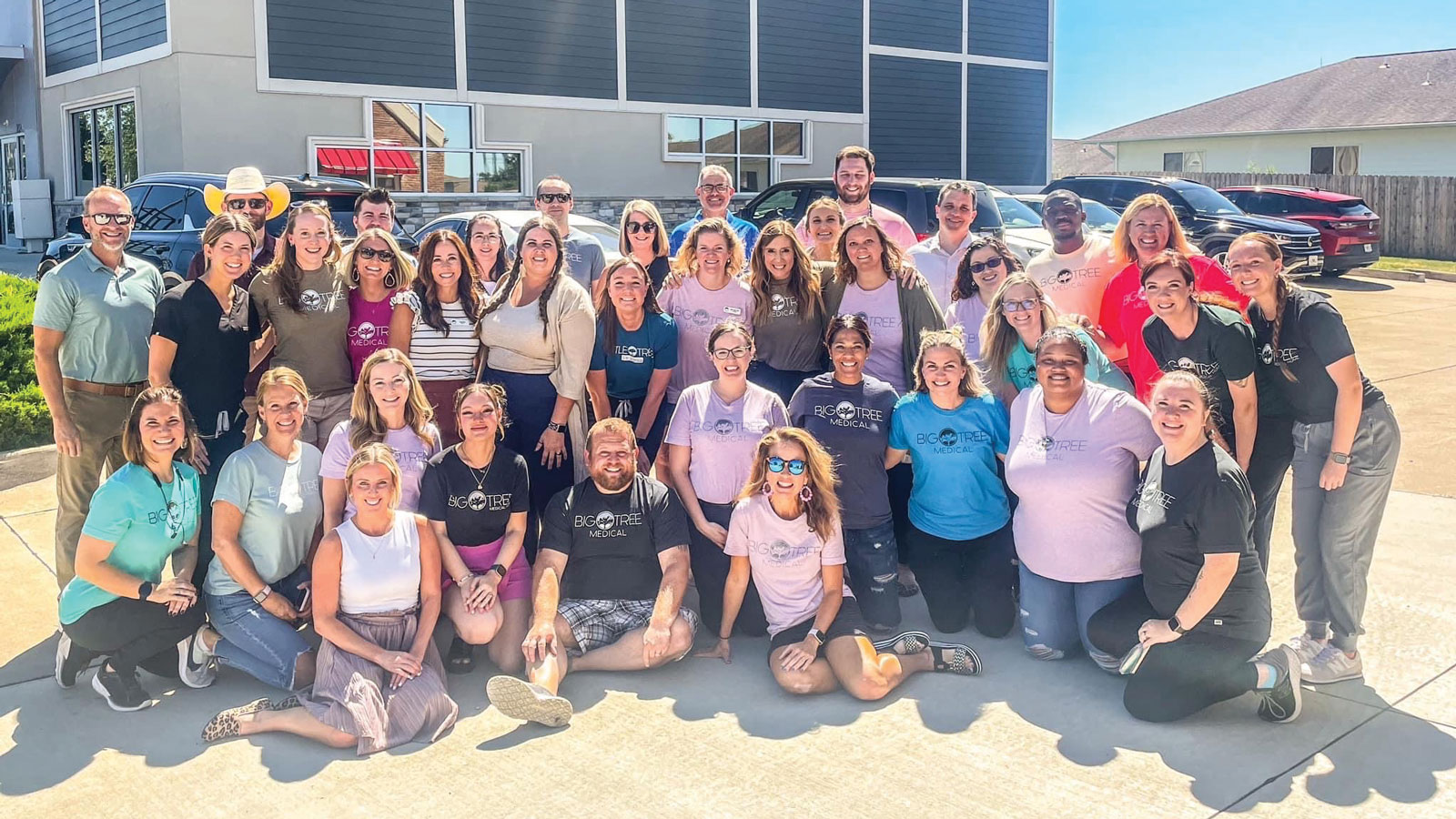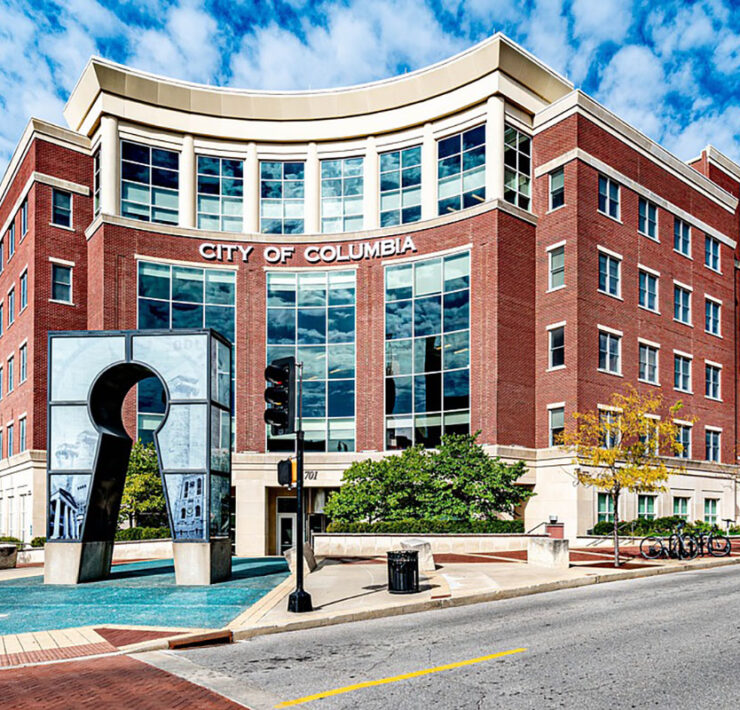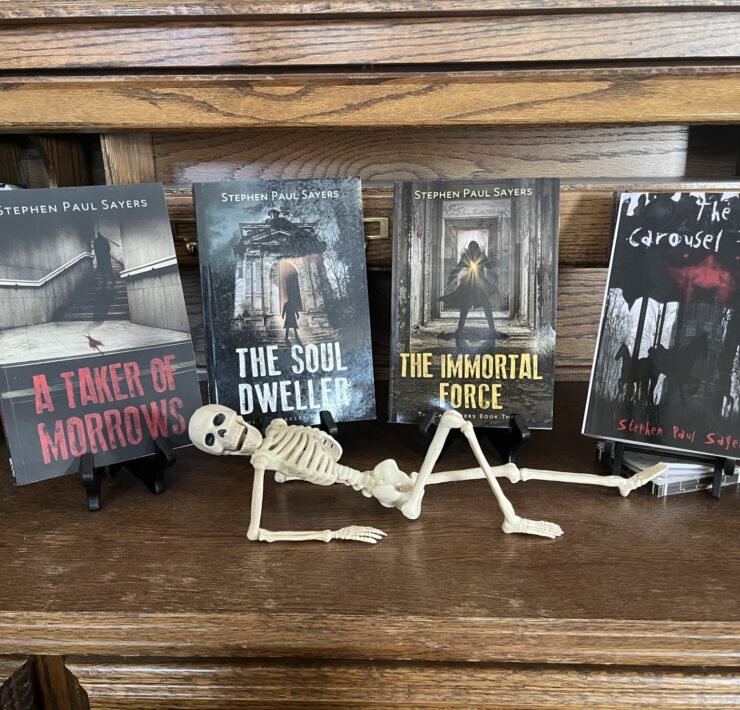A Novel Approach to Health Coverage Takes Root
- This story originally appeared in the January 2024 health and wellness issue of COMO Magazine.

Big Tree Medical saves patients money with a direct primary care model.
If you’re reading this, there’s a good chance you are one of the millions of Americans who pays for a monthly subscription of some kind, say Netflix or Instacart. For a monthly fee, you get unlimited viewing or unlimited free grocery delivery, respectively. The pandemic brought a boom in many of the subscription services that offer access — sometimes unlimited — that consumers now demand.
But have you ever considered a subscription-based health plan? A plan that for a monthly fee provides unlimited access to your health care providers? It’s called the direct primary care model (DPC), it’s saving patients money, and it has taken root in mid-Missouri.
In 2017, Jen Wheeler and her pediatrician husband, Dr. Adam Wheeler, opened Big Tree Medical. Big Tree offers primary care for adults and children, counseling, discounted labwork, and 180 free generic medications for members. In just six years, Big Tree has grown the practice to more than 10,000 members representing 25,000 patients, and it has sixty locations nationally, a number Jen expects to double in 2024. There is no provider network, so member patients can see whatever doctors they want.
“We started Big Tree because my husband wanted to have a clinic for adults that was easy to get into and affordable, and he wanted adults to have the ability to text message their provider anytime and get 24/7 care,” Jen explains. And she spends a lot of time explaining what Big Tree does.
A couple of years prior, Adam heard about the direct primary care model and visited with many private, independent family medicine doctors about starting a DPC clinic, and while several thought it was a great concept, the well-established physicians found it too risky.
When You Want Something Done Right…
When Adam couldn’t find a doctor to start a DPC model clinic, he decided to do it himself. He asked his wife, an entrepreneur, to help him.
“He asked me to take a risk and try this with him and I was thinking about starting a business myself at that same time [a call nurse triage line]. So I gave up that idea and decided to join him in this effort. I knew it would take both of us,” says Jen, CEO of Big Tree.
Jen’s sister is an internal medicine doctor in Columbia, and Jen says that because her sister is so booked, the nearest appointment date is two months out — even if you’re sick. When doctors’ offices are booked, sick patients head for urgent care. Jen says the traditional health care system is set up that way on purpose because care providers receive more money from your health insurance company when you go to urgent care.
Direct primary care doesn’t seek to profit from illness and instead prioritizes patient well-being over dollars and cents.
“We wanted to solve that first of all. We wanted to always have openings, and I’ve always gotten that question over the years of, ‘So are you guys still taking patients?’ and I’m like, ‘Absolutely.’ I’ll just hire more doctors, and then secondly, we wanted to be able to offer same-day appointments.”
One pride point for Big Tree is its ability to offer 180 generic medications, including birth control, mental health drugs, chronic disease drugs, and even generic Cialis to its members at no charge.
“I don’t think you can find any clinic in the nation that gives medications away for free, or if you do, not 180 different ones,” Jen explains. “We’re one of the only clinics in the nation doing this. So I definitely don’t make any money off my pharmacy. I lose money on my pharmacy, but it’s all the generics.”
How the DPC Model Works
Big Tree offers a variety of membership options to provide affordable options for everyone, including businesses of any size. For individuals, there are memberships for $35, $55, $70, and $175 per month. Each membership level offers 24/7 access to care providers, discounted medications, and discounted labs. Initially, Big Tree wanted one all-encompassing membership for a flat rate, but it added other levels to meet various patient needs. Jen says the clinics started accepting third-party insurance three years ago, because so many people have employer-provided insurance that they want to use.
For people who want to use their health insurance, Big Tree has an “access membership.” For $35, Big Tree will process your insurance and will collect your co-pay. Those patients are then able to text in or talk to nurses if no appointment is necessary. The other perks remain: same-day appointments, low-cost labs, and free meds all for just $35 a month. The “virtual membership,” a $55 per month service, took off soon after Big Tree opened because there were patients from Poplar Bluff, Kansas City, St. Louis, and other locations “who really weren’t going to drive all the way to Columbia to see us,” Jen says.
The virtual membership offers 24/7 access to care providers through text or video chat via their app.
“It is a perfect option for those who live in rural communities or regularly travel for work or pleasure,” says the Big Tree website. The $70/month individual unlimited membership offers unlimited interactions in person at their clinics or via their app. Clinics are located in Columbia, Sedalia, Boonville, and Jefferson City, mostly inside pharmacies and existing clinics.
You may be wondering, how is this so inexpensive? The Big Tree website answers this succinctly: “Compared to regular clinics, we spread your costs over the course of a year. We save money on overhead by not operating physical clinics. We specifically use nurse practitioners and physician assistants because they occupy a sweet spot of cost and quality, allowing you to get great care for a fraction of the cost you find at doctors-only clinics.”
Ok, but what if you get cancer or need a hospital stay? You’re going to need to see some specialists. Big Tree has a solution for that, too.
Walking Away From Health Insurance
The Big Tree “unlimited plus membership” is Big Tree’s solution for patients who want to ditch third-party health insurance altogether, or for patients who want an alternative to Affordable Care Act (Obamacare) plans, and who also want more robust coverage. Big Tree partners with Sedera, a nonprofit, medical cost-sharing community of members who pay a monthly fee that helps to pay the medical bills of fellow members (and, in turn, for you, should the need arise). Members choose their plan level based on how much financial burden, or IUA (initial unshareable amount, which can be thought of as an “out of pocket maximum”), they can handle on their own before the cost-sharing kicks in; the IUA levels range from $500 to $5,000 – the higher your IUA, the lower your membership rate is.
The unlimited plus membership includes all of the benefits of the unlimited membership, but you can see any doctor you want (say, a specialist) for a copay ($25 for primary care, $50 for specialists), and then Big Tree picks up the rest of the bill. Unlimited Plus members get discounted rates on the Sedera cost-sharing plans, as well. Adding the Sedera membership provides the security of having coverage for catastrophic medical events that many patients need or desire.
“So there’s a little bit of being brave, especially when you’re completely going all in and walking away from health insurance, which is what I did and I’m so glad I did, because I used to pay $2,500 a month for health insurance,” Jen says about paying for insurance for her family of four before starting Big Tree. “I have saved more than $100,000 in the last four years that I’ve been on this plan — $100,000 is huge money for my family.”
Jen says Big Tree’s most popular services are medical weight loss management, which generally is not covered by traditional health insurance; mental health services (members pay just $25/counseling session); and ADD treatment for both children and adults. And Jen says they’re always adding perks and new things like Botox injections, allergy testing and drops, and bioidentical hormone pellet therapies; last year they added an x-ray machine, and members are not charged for radiographs.
“We realized with the membership model that we don’t have to make money on everything, and we want to have all kinds of benefits for people to have a membership with us,” Jen explains. “So another thing we’re going to be doing in 2024 is offering autism diagnosis for a lower cost.” Jen and Adam also are co-owners of the Hero Clinic in Columbia, which diagnoses and treats childhood developmental and behavioral disorders, such as autism and ADD.
As active entrepreneurs and problem-solvers, Jen and Adam expect to continue adding locations and services that save money and increase patient satisfaction with the health care system.
Big Tree Medical Missouri Locations
D&H Pharmacy & Clinic
1814 Paris Rd, Columbia, MO
Little Tree Pediatrics and Urgent Care
206 Corporate Lake Dr, Columbia, MO
Big Tree Medical Boonville
2400 Boonslick Dr, Boonville, MO
Big Tree Medical Sedalia
2410 S Limit Ave, Sedalia, MO
Big Tree Medical Jefferson City
1850 Southridge Dr, Jefferson City, MO
Big Tree Medical Clinics
530 E Highway 24, Moberly, MO








